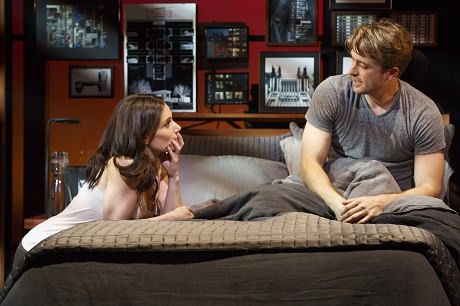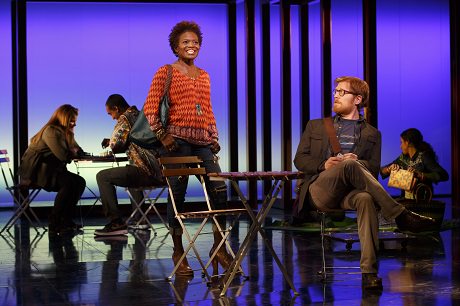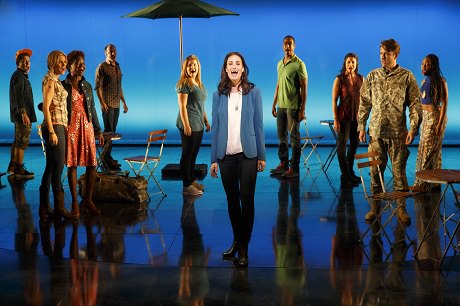The first time I saw If/Then, I knew I would be seeing it again. The show’s beauty, originality, and heart won me over, and that experience increased all the way through. I wrote a review for DCMetroTheaterArts in which I called If/Then “an inspiration to fall back in love with one’s own life.” Days after, the extraordinary experience stayed with me.

I happen not to be a huge fan of Broadway musicals per se. I mean no disrespect to those who are. But big musicals can leave me cold unless they engage me in content and characters that are worth caring about and connect to life in a meaningful way. Over the past decade I’ve seen some Broadway musicals that were box-office bonanzas but I thought were an empty snooze (The Drowsy Chaperone and The Phantom of the Opera being two). On the other hand, I have really loved some (Urinetown and The Book of Mormon come to mind). And there are some I not only loved but could not wait to get the cast recording (Les Misérables, and Spring Awakening).
But never before If/Then have I wanted to see a musical again asap. I just had to. And so I did.
On my second viewing of If/Then—which had not dimmed one iota in luster—I found myself appreciating even more the emotional honesty of the music and lyrics, the crystal-pure singing voices, the script’s wit, the abundance of up-to-the-minute relevance and all-out authenticity. If/Then could never have existed before social-change movements for black, women’s, and same-gender-loving human rights. And it never could have touched so deeply the pulse of such a wondrous variety of affectional relationships had its creators and performers not been committed in every detail to its characters’ full potential. On top of all that, the show’s savvy character-illuminating references to economic justice, reproductive choice, electoral politics, the Iraq war, and more make If/Then a dazzling kaleidoscope of the very character of our times.
By the time I revisited If/Then, I had read what some other local reviewers had written about it. I confess I was flabbergasted that so many were picking apart a show that did not seem the same one I had been so moved by. I am certain there’s an audience that will absolutely love this show too (I spoke with a young man in the lobby who had already seen it four times). But even savvy theatergoers would not have a clue from some of these other reviews what If/Then actually is.
On just about every feature that got critical barbs, I had a different take. The choreography, for instance. What I really admired about it was that the movements seemed intentionally natural, not artificially or superficially dancerly. The chorus felt like an integral part of the whole cast of individuated characters, not generic adjuncts. They seemed to represent a range of body shapes and sizes and colors and sexual orientations, which to me evoked what it was like to walk around in Manhattan when I lived there. In other words the esthetic of the choreography seemed of a piece with the show’s human authenticity.
The length of Act One was also carped about. Some said Act Two was much better, more focused. My experience was completely different. On first viewing the whole show seemed to go by so fast I was shocked when I looked at my watch at the end. (I had not known the runtime beforehand). On second viewing, I figured out why the show had seemed swift. I had been swept up in the pleasures of learning more and more about how the same supporting characters (each utterly fascinating in his or her own right) figured into each other’s lives and into the main character’s two lifelines, as “Liz” and “Beth.”
That twofold storytelling device seemed to be a critical sticking point. I was aware going in the first time that there would be two divergent story lines for the same main character. Honestly, though, I soon relaxed about being certain whether I was in Liz’s world or Beth’s. It did help when another character addressed her by her nom du plotline within the first line or two of a scene or beat, but in moments when I wasn’t positive, I really wasn’t bothered. Because something else overwhelming was going on. Before I get to that “something else”—which I did not at first know how to describe—I want to report my experience of watching the two storylines unfold having seen the whole show already.
First of all: Once the diverging plots are set up during the opening number in Madison Park, I never did not know whether I was watching “Liz” or “Beth”—and I picked up on the distinct ways Idina Menzel expresses each persona in her body language and speaking voice, an aspect of her awesome performance that escaped me before.
Second: Some critics have discussed some red/blue color-coded lighting scheme that ostensibly distinguishes between the two storylines. On both viewings I found the lighting design beautiful and dramatic—but irrelevant to my understanding whose story I was in. Sorry, I don’t watch the cyclorama change color in order to engage with a character’s story; that for me would be self-induced attention-deficit disorder. Occasionally on second viewing, when Liz or Beth was not in a scene, I wasn’t exactly certain whose story the supporting characters were now in, but it never mattered—because of that overriding “something else.”

Third: My only suggestion to the creators is to maybe take another look at that very first scene when the fork in Elizabeth’s life path is set up as she double-books a meetup with her new friend Kate (LaChanze) and her college chum Lucas (Anthony Rapp) and meets (or doesn’t meet) Josh (James Snyder). I couldn’t follow that one even on second viewing—though again it ultimately didn’t matter to my experience of…the “something else.”
So what’s with this “something else”?
I did a little research to find the right words to describe it. And I realized this “something else” is a direct consequence of the If/Then creators’ original genre-bending. There are two kinds of musical, I learned: a “book musical” and a “concept musical.” There didn’t used to be a distinction until 1971, when the critic Martin Gottfried wrote an influential essay about the musical Follies in which he defined a concept musical as “a show whose music, lyrics, dance, stage movement, and dialogue are woven through each other in the creation of a tapestry-like theme (rather than in support of a plot).” His essay, Flipping Over Follies, is well worth a read, because it points precisely to what is going on today with If/Then: critics are expecting merely a book musical and not getting what they’re looking for; meanwhile If/Then is offering a concept musical that can give audiences much better and much more.
I tried in my review to express the “tapestry-like theme” I found in If/Then. (It’s one that happened to speak to me personally. I kept being reminded of how much chance had to do with what I had thought were my romantic choices. In that sense If/Then is definitely a show to see with someone you love.)

But If/Then’s thematic tapestry is as sweeping as it is variegated. It runs through every song. It runs through every scene. Anyone open to finding where and how that tapestry hooks them will find reverberations of their own life in the resounding theme of this unprecedented musical marvel.
If/Then plays through December 8, 2013 at The National Theatre – 1321 Pennsylvania Avenue, NW, in Washington, DC. For tickets, call (800) 514-3849 (ETIX), or by visiting the Box Office, or by purchasing them online.
LINKS
John Stoltenberg’s review of If/Then on DCMetroTheaterArts.
Interviews with the cast of If/Then by Joel Markowitz:
Introducing the Cast of If/Then at The National Theatre–Part 1: Jason Tam .
Introducing the Cast of If/Then at The National Theatre–Part 2: Jenn Colella.
Introducing the Cast of If/Then at The National Theatre–Part 3: James Snyder.
Introducing the Cast of If/Then at The National Theatre–Part 4: Jerry Dixon.
New Tom Kitt and Brian Yorkey’s ‘If/Then’ with Idina Menzel to Stop at National Theatre on DCMetroTheaterArts.
‘If/Then’ Video Released-Begins at National Theatre on November 5th on DCMetroTheaterArts.
DCMetroTheaterArts coverage of If/Then.
Read other DC area reviews of If/Then in ‘Other Reviews.’





You can’t talk people into liking something just because you like it and it is very odd that you would revisit the show just to write nasty things about other reviewers. I saw the show and practically fell asleep. It was too long, had too many cliches, had unlikeable characters (waahh I could get married or have a career – what is this? 1980?), had too much swearing (is she 39 or 15?), bad songs (I love you I hate you – again is she 39 or 15?), and the worst part – it was boring
I have to agree with the poster above. Very difficult to get emotionally invested in the characters. Liz/Beth just seemed like a self absorbed teenager. And I agree, hated the “Love you/Hate you” song–NOBODY who is supposedly a mature 39 y ear old would say those things to a family member getting deployed. At that moment, I started waiting for the show to wind up so I could go out for dinner.